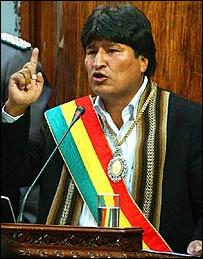Bolivia's Morales prepares for Argentine summit
Venezuelan leader Hugo Chavez paid a last-minute visit of support to Bolivian President Evo Morales ahead of a hastily-arranged summit to avert a regional crisis over the Andean nation's nationalization of its natural gas sector.

The socialist Chavez, a political mentor and ally of the leftist Morales, said he came to Bolivia late Wednesday not to give advice but to offer "congratulations and learn from Bolivia's wisdom."
"With good will, Morales will reach the agreements he needs to make with the foreign companies," Chavez said after arriving in the capital of La Paz.
Chavez spoke after Brazil, Bolivia's biggest gas client, summarily announced it would cut off all new petroleum investment in the Andean nation where it has pumped US$1.6 billion ( Ђ 1.27 billion) to boost production over the last decade.
Just hours earlier, the European Union expressed concern over Morales' order for army troops to guard more than 50 natural gas installations, most operated by foreign companies since Bolivia privatized petroleum production in the mid-1990s.
Morales and Chavez will fly Thursday morning to the Argentine city of Puerto Iguazu along the border with Brazil. There, they will join Brazilian President Luiz Inacio Lula da Silva and Argentine President Nestor Kirchner to discuss Monday's announcement by Morales that he had nationalized Bolivia's natural gas reserves and will reduce foreign participants to minority players.
While Silva said he believes he can negotiate a solution to the controversy, he asserted he will defend its contracts giving it rights to Bolivian gas.
"The fact that Bolivia has rights does not deny the fact that Brazil has rights in the matter as well," Silva said.
Morales and Chavez also planned to discuss Chavez's idea to construct a 9,000-kilometer (5,600-mile) pipeline linking Venezuela's vast natural gas reserves through Brazil to Argentina, Chavez said.
The pipeline, estimated at US$25 billion ( Ђ 19.8 billion), would also branch to Bolivia, Paraguay and Uruguay, though experts have predicted the cost could come in much higher and environmentalists are already railing against the project because it would cut through the Amazon.
The summit comes amid a tense backdrop, with Argentina and Brazil resisting for weeks Bolivian demands that they should pay more for the gas, used for power generation, cooking gas and to fuel cars, reports the AP.
I.L.
Subscribe to Pravda.Ru Telegram channel, Facebook, RSS!




